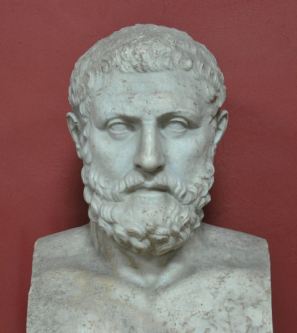 Aquinas’ De regno ad regem Cypiri (Address to the King of Cyprus, circa 13th C.) : interesting to read this short work written by Thomas Aquinas, especially the section on tyrants and tyrannicide, which I find to be a fertile source for contemporary political thought and discussion. A special note to make is that for Aquinas, a monarchy is the best political arrangement, hence the discussion is centered on the king.
Aquinas’ De regno ad regem Cypiri (Address to the King of Cyprus, circa 13th C.) : interesting to read this short work written by Thomas Aquinas, especially the section on tyrants and tyrannicide, which I find to be a fertile source for contemporary political thought and discussion. A special note to make is that for Aquinas, a monarchy is the best political arrangement, hence the discussion is centered on the king.
Aquinas is reluctant to endorse private ventures to kill a tyrant; at the most, he appears to allow an uprising led by public authority as a last resort (I suppose, to give it a cloak of legality). Calvin follows this line, as do the Dutch Calvinists (for example, getting William of Orange to lead against Spanish tyranny), but I am not sure if Calvin et al acknowledge Aquinas as their source for their position.
Too, one thinks of the failed attempt to assassinate Hitler that was joined by the Lutheran theologian Diectrich Bonhoeffer, which seems to meet Aquinas’ requirement, as it was hatched by a small group that involved military officers and a couple of civil servants, who thus might qualify as public authorities. Yet Aquinas gives sufficient caution against such an adventurism, citing Roman examples when the ouster of a tyrant led to worse tyrannies. (Think of Pol Pot too!)
He also appears to provide a basis for later social contract theories here: ” If to provide itself with a king belongs to the right of a given multitude, it is not unjust that the king be deposed or have his power restricted by that same multitude if, becoming a tyrant, he abuses the royal power. It must not be thought that such a multitude is acting unfaithfully in deposing the tyrant, even though it had previously subjected itself to him in perpetuity, because he himself has deserved that the covenant with his subjects should not be kept, since, in ruling the multitude, he did not act faithfully as the office of a king demands.”
As earlier stated, Calvin and the Dutch Calvinists appear to echo this Thomist idea of revolt led by public authority; The English Puritans also argue that the governed have the right to revolt against unjust leaders. The American revolutionaries who rose up against the British re-state the same idea, by way of the English social contractarians, notably John Locke.
Ideas have legs, indeed? (Also serves to show Ecclessiastes is right — there is nothing new under the sun. Human nature, being what it is, often falls victim to the same weaknesses and bad habits). Hence the relevance of the battle cry — ad fontes!
Finally, Aquinas allows that tyrants may have been allowed by God to rise to power as punishment for the sins of the people. Now we Filipinos should start asking ourselves whether the present darkness is a punishment or a reward.
(photo of the Tyrant Periander of Corinth’s source)
